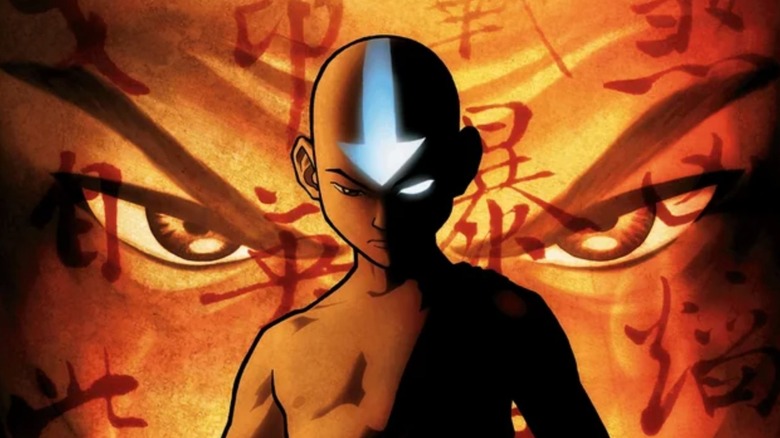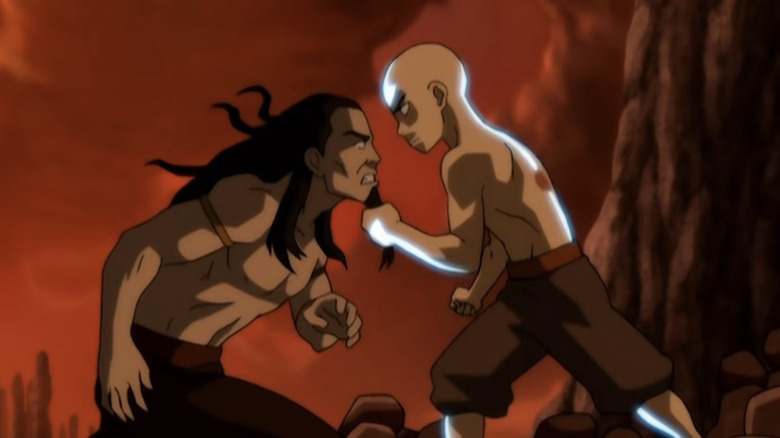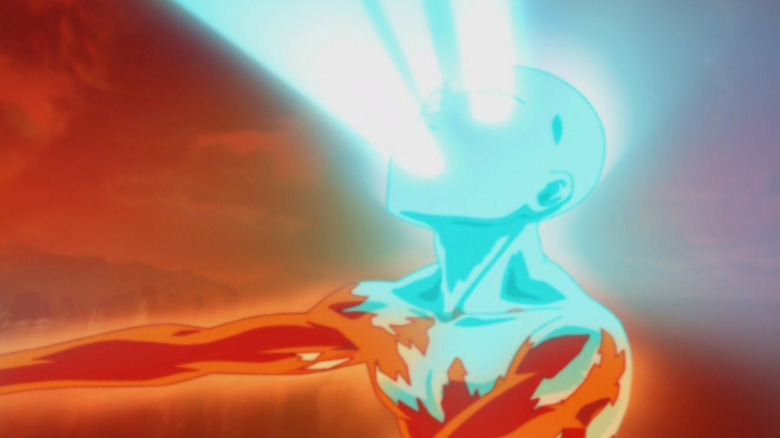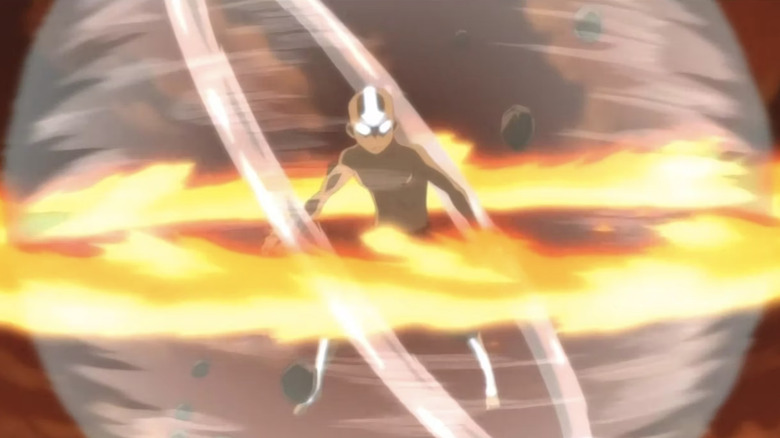Why Avatar: The Last Airbender's Most Controversial Moment Happened (And Why People Are Still Arguing About It)
It's been 15 years since "Avatar: The Last Airbender" closed out with the four-part finale "Sozin's Comet." "Avatar" is a show that just got better and better as it went on, and the finale has some of its highest highs and was acclaimed as a satisfying conclusion that met atmospheric expectations. But there is one sticking point for controversy and it's a pretty big one: how Avatar Aang (Zach Tyler Eisen) disposes of the series' main villain, Fire Lord Ozai (Mark Hamill), or rather, how he doesn't.
Aang is an Air Nomad, a pacifistic people wiped out a century prior by the expansionist Fire Nation. Maybe another hero would eagerly face The Fire Lord for revenge, but that's not who Aang is. Instead, he stresses out. He's been taught since birth that taking any life is wrong, but now, the only logical choice to save the world is to kill Ozai. If he holds back, then Ozai will probably win.
Thanks to a last-minute visit from an ancient spiritual beast called a Lion Turtle, Aang gets a third option. After subduing the Fire Lord, Aang reaches into Ozai's soul and takes away his Firebending. This turns him from the world's deadliest man into a non-threat, in turn allowing his son/Aang's friend Zuko (Dante Basco) to take the Fire Nation throne.
Not everyone dislikes this resolution, but if you find any complaints about "Sozin's Comet," odds are it'll be about this. Some say Aang should've killed Ozai and his getting an out cheapens the episode's conflict. Others say it's a problem of execution, not intent. "Avatar" has a very devoted fanbase so the debates rage on to this day.
Why does the episode unfold the way it does, and are there genuine critiques to be made?
Establishing the stakes
The show had built up to Aang fighting Ozai since Book 1, "Water." In the series' first two-parter, "The Winter Solstice," Aang meets the spirit of his predecessor, Avatar Roku (James Garrett). Roku warns Aang of an imminent threat; by the end of the summer, Sozin's Comet will pass over Earth and give Firebenders an enormous power boost. If Aang doesn't master the four elements and defeat the Fire Lord before then, the world will fall.
This deadline takes over as the narrative's driving force, but Aang only begins to contemplate what facing the Fire Lord actually means in Book 3 episode, "Nightmares and Daydreams." As you might've guessed, he has several dreams about meeting Ozai where the fight goes poorly (albeit played for comedy).
Aang's "to kill or not to kill" dilemma in the finale is foreshadowed in "The Southern Raiders." Katara (Mae Whitman) tracks down the Fire Nation soldier who killed her mother; Aang tells her to let go of her anger while Zuko tells her to execute him. Ultimately, Katara stays her hand, deciding her quarry's miserable existence is punishment enough. The episode ends with Zuko asking Aang that, if he's such a pacifist, then how he intends to defeat the Fire Lord. Aang's face shows that he hasn't even asked himself that question.
A lack of foreshadowing
There's one problem; Aang only really wrestles with what to do on the eve of his battle with Ozai. In turn, the solution is delivered to him quickly. The concept of taking someone's bending away is also delayed until the very last minute; when Aang bends his and Ozai's souls together, we don't even know what he's trying to do until after it's completed. We can glean that it will be bad if Ozai's orange aura overpowers Aang's blue one but the mechanics and specific stakes needed to be laid out in more detail. As a result, Aang's entire internal conflict can feel like manufactured drama.
Now, the Lion Turtle and Aang's solution weren't something the writers of "The Last Airbender" came up with at the last minute. A Lion Turtle statue appears in the title sequence of every episode and in the series production bible, it is written that Aang will take away Ozai's Firebending "using a technique available only to the Avatar."
It feels like since co-creators Bryan Konietzko and Michael Dante DiMartino knew their destination, they forgot to plant clues for everyone else. If I can play script doctor, I'd say they needed to introduce "Energybending" as a concept before the finale, depict it as a last resort rather than a deus ex machina, and have Aang wrestle with his desire and duty regarding killing in earlier episodes.
It should be clear that my issue with this conclusion is how it's told — it's okay as is and I think with a little clean-up, it would sing. Some fans, however, reject it outright.
Why an easy out?
During "Sozin's Comet," everyone from Aang's friends to past Avatars tell him that his responsibility to the world outweighs all else. More than a few fans agree with them, believing that Aang should've had to make a hard choice and kill Ozai. Why didn't the creators go that route? Konietzko gives this answer on the commentary track for "Sozin's Comet," over the scene where a fully-powered-up Aang almost smites Ozai like the Angel of Death:
"Back to Aang as this wrathful thing [...] obviously in this state, Aang could just wipe Ozai off the face of the Earth, but is that really what the world needs at this point? [...] Everyone's been oppressed and fearful for a hundred years, do they really need some all-powerful being just wiping people out? You know, it's not really the remedy for the world's situation."
After the battle, Zuko says he wants to create "a new era of love and peace" alongside Aang, but that sentiment could ring hollow if Aang had just carried out divine retribution. Killing Ozai would also color what kind of Avatar Aang would be from that point on, one who ruthlessly defines and delivers justice. In the sequel "The Legend of Korra," flashbacks show that Aang faced a Bloodbending crime boss named Yakone about 40 years after "Sozin's Comet." He ultimately takes Yakone's bending away like he did Ozai's, showing how the decision he made in "Sozin's Comet" shaped him.
Now, in the real world, people often have to make decisions they find distasteful. "Avatar" doesn't sugarcoat things (Hamill accurately said it talks up to children, not down to them), so why should Aang's decision be different? Aang is a hero, an aspirational figure, and an impossibly pure one.
Pulling off the impossible is what he does — the show just needed to explore how and why he did it with more clarity.



